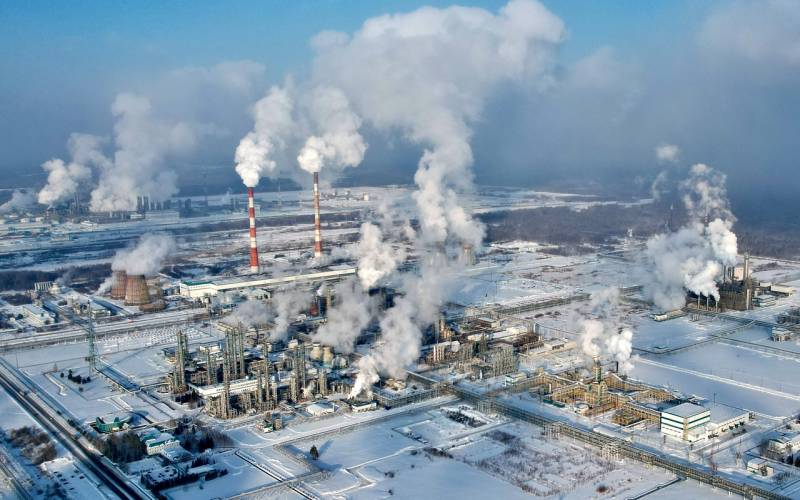Development of ZapSibNeftekhim: Russia focuses on refining
"West Siberian Petrochemical Plant" is the largest petrochemical project in modern Russia. The enterprise was launched at full capacity in 2020, its construction lasted for six years. The plant is capable of annually producing more than 2,2 million tons of products (polyethylene, polypropylene and monomers). The implementation of this project allowed the Russian Federation to import substitute some types of products that were previously purchased exclusively abroad.
In 1999, SIBUR (one of the largest integrated petrochemical companies in the Russian Federation) included the Tobolsk Petrochemical Plant, which was founded in 1984. The reason for this decision was the complex economic a situation in the country that led to one of the largest enterprises in Tobolsk being on the verge of bankruptcy. Production capacity was practically not used, and the company's products were not in demand.
In 2012, as part of the St. Petersburg International Economic Forum, SIBUR and the German company Linde AG signed an agreement to design the largest petrochemical production facility in the history of modern Russia in Tobolsk. The terms of the agreement provided for the preparation by a company from Germany of a feasibility study for the project, as well as the development of sections of the project documentation.
Construction of the plant itself started in 2014. The project parameters included the commissioning of a pyrolysis plant with a capacity of 1,5 million tons of ethylene, 1,5 million tons of polyethylene and about 500 thousand tons of propylene per year. The cost of creating a new industrial facility of this scale was estimated at $9,5 billion. Turkish companies Rönesans and Yamata took part in the project; they provided 15 thousand workers, more than three thousand of them were Turkish citizens. Already in 2020, the enterprise was launched at full capacity. It is capable of annually producing more than 2,2 million tons of products (ethylene, polyethylene and propylene). The general director of ZapSibNeftekhim and SIBUR-Tobolsk (who was involved in putting the enterprise into operation), Igor Klimov, then emphasized that the plant would specialize in processing the resulting raw materials into highly profitable petrochemical products. For the Russian Federation, a state that many in the world associate with a “gas station country,” the appearance of such a facility should be a huge help. In addition, the new petrochemical complex, which has become one of the most developed in the world, will allow SIBUR to be more resistant to market fluctuations in the global energy market, expanding the geography and range of exports.
A little later, this information was confirmed by SIBUR General Director Mikhail Karisalov. In his interview with Kommersant, he noted that just six years ago the share of petrochemicals in the company’s income was only 20–30%, now it will reach 60%. Products with high added value have always been appreciated in the international market. Unlike the raw materials segment, it is much less susceptible to price fluctuations. In addition, SIBUR management records an increasing demand in a number of industries for technological solutions made from modern synthetic materials.
In 2020, ZapSibNeftekhim produced about 60% of all domestic polypropylene and 50% of polyethylene. The enterprise plays a key role in the economy of the Tyumen region and all of Russia. We should not forget about the socio-economic significance of this enterprise for Tobolsk itself. A small Siberian city is receiving additional jobs; urban infrastructure development projects are being implemented on its territory, making life in the city more comfortable.
The plant also plays a great role in issues related to import substitution. Thus, the volume of imports of polymers from abroad into the Russian Federation decreases annually; the development of domestic production plays a key role here: 2020 thousand tons were imported in 730, 2021 thousand tons in 710, and only 2022 thousand tons in 559. In addition, in 2022, commissioning work on a new maleic anhydride production facility was completed on the territory of ZapSibNeftekhim; its capacity should be 45 thousand tons per year. Such volumes should fully satisfy the demand of domestic producers for maleic anhydride, the entire volume of which was previously purchased abroad. It is also necessary to clarify that this organic compound is used in construction, agriculture, automotive industry, production of paints and varnishes, furniture, pharmaceuticals and other sectors of the economy.
Already in the summer of 2023, construction of a new polypropylene foam production complex began at the industrial site of ZapSibNeftekhim. It is expected that the implementation of this project will make it possible to further involve liquefied hydrocarbon gas in advanced processing for the production of in-demand petrochemical products, which in the foreseeable future will provide an opportunity to replace the import of large-capacity polymers. The launch of the new complex is scheduled for 2027, and its approximate cost will be about 195 billion rubles.
To summarize, I would like to note that the presence of domestic industries that make it possible to meet the needs of the domestic market in the current geopolitical conditions is currently a critically important parameter on which the technological sovereignty of the Russian Federation depends. SIBUR production sites are located in more than 20 regions of Russia; many of the company’s facilities are implementing projects that are fully consistent with the economic interests of our country. The development of processing industries will allow Russia to expand its export range and feel more confident in the international market. It is thanks to such structural changes that there is hope that in the very near future the Russian Federation will be able to completely get rid of the unpleasant status of a “gas station country.”

Information